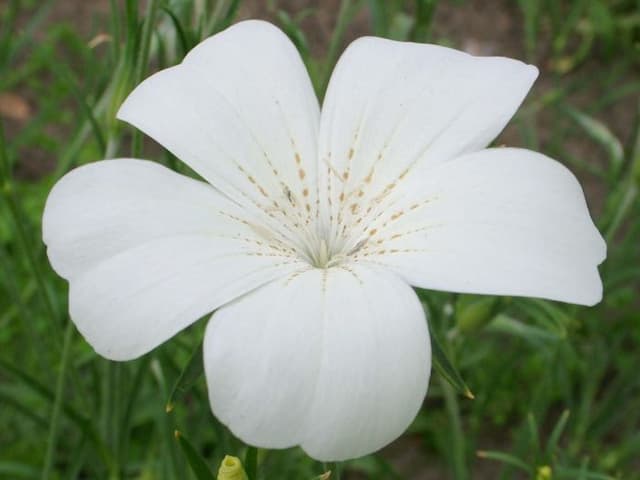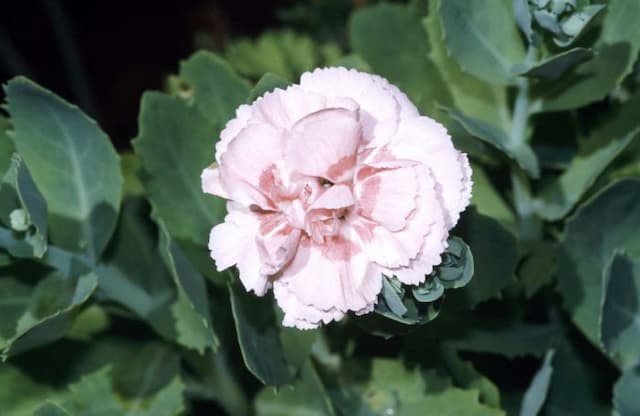Rose Campion Lychnis coronaria

ABOUT
Lychnis coronaria, commonly known as rose campion, is an eye-catching perennial with a striking appearance. The plant is characterized by its vivid magenta flowers, each with five distinctive petals that are slightly ruffled at the edges, creating a look of softness and depth. These blossoms are borne on top of tall, silvery-gray stalks which contrast beautifully with the flowers. The foliage of rose campion is equally notable; it is comprised of woolly, silvery leaves that form a dense basal rosette. The leaves are lance-shaped with a slightly furry or felt-like texture, enhancing the plant's overall silver-gray color theme. The combination of the brilliant magenta blooms against the silvery foliage makes the rose campion a visually stunning addition to any garden setting.
About this plant
 Names
NamesSynonyms
Rose Campion, Crown Pink, Dusty Miller, Mullein Pink, Bloody William, Lamp Flower
Common names
Agrostemma coronaria, Coronaria coriacea, Coronaria flos-cuculi var. pleniflora, Lychnis affinis, Lychnis coronaria var. purpurascens, Lychnis sieboldii, Silene coronaria.
 Toxicity
ToxicityTo humans
Rose Campion is not widely recognized as a poisonous plant to humans. While generally considered non-toxic, eating or handling plants can sometimes cause allergic reactions in certain individuals. The plant is not associated with severe toxicity or poisoning in humans. However, it's always prudent to avoid ingesting plants that are not specifically grown for consumption, as they can cause gastrointestinal upset or other mild reactions in sensitive individuals.
To pets
Rose Campion is also not widely known to be toxic to pets. It's not listed on common toxic plant databases for pets such as those maintained by the ASPCA. However, similar to humans, ingestion might cause mild gastrointestinal upset in some pets, such as vomiting or diarrhea. If your pet ingests part of this plant and shows adverse symptoms, it is recommended to contact a veterinarian.
 Characteristics
CharacteristicsLife cycle
Perennials
Foliage type
Deciduous
Color of leaves
Grey-green
Flower color
Magenta
Height
2-3 feet (60-90 cm)
Spread
1-2 feet (30-60 cm)
Plant type
Herb
Hardiness zones
4-8
Native area
Southern Europe
Benefits
 General Benefits
General Benefits- Ornamental Appeal: The rose campion adds vibrant color to gardens with its bright magenta flowers.
- Easy Care: Rose campion is drought-tolerant and low-maintenance, making it suitable for gardeners of all skill levels.
- Pollinator Attraction: The flowers attract bees, butterflies, and other beneficial insects, promoting pollination in your garden.
- Drought Tolerance: Once established, rose campion is resilient to periods of low water, which is beneficial in xeriscaping or water-wise gardens.
- Self-Seeding: Rose campion can self-seed under favorable conditions, offering a way to naturally replenish and expand garden displays.
- Versatility: The plant can be used in various garden settings, including borders, rock gardens, and cottage gardens.
- Deer Resistance: Rose campion is generally resistant to deer, making it a good option for gardens in areas with deer populations.
 Medical Properties
Medical PropertiesThis plant is not used for medical purposes.
 Air-purifying Qualities
Air-purifying QualitiesThis plant is not specifically known for air purifying qualities.
 Other Uses
Other Uses- Lychnis coronaria, commonly known as rose campion, can be used as a natural dye, imparting a red or pink color to fabrics when used in traditional dyeing processes.
- The velvety texture of the leaves has inspired artists to use them as a natural stencil for creating patterns in artwork and crafts.
- The bright flowers of rose campion can be floated in water features or birdbaths to add a pop of color and visual interest to garden water elements.
- Its drought-tolerant properties make rose campion a suitable choice for xeriscaping, contributing to environmentally friendly gardening practices that reduce the need for water.
- Rose campion can be used as a companion plant to deter pests from more vulnerable crops or ornamentals due to its fuzzy leaves and stems, which many pests find unappealing.
- Its striking color contrast between the silvery foliage and the vibrant flowers can be usefully employed in moon gardens, where the silver foliage glows in the moonlight.
- Rose campion is sometimes used in flower arranging or dried floral crafts due to its long-lasting flowers and ability to retain color after drying.
- The plant can serve as an indicator of soil pH, where the color intensity of the flowers may vary depending on the alkalinity or acidity of the soil.
- Its self-seeding ability enables rose campion to be used in erosion control, as it can easily establish itself in difficult terrains, helping to stabilize the soil.
- Decorative seed heads of rose campion can be left on the plant during the fall and winter to add textural interest to the garden during the colder months.
Interesting Facts
 Feng Shui
Feng ShuiThe Rose Campion is not used in Feng Shui practice.
 Zodiac Sign Compitability
Zodiac Sign CompitabilityThe Rose Campion is not used in astrology practice.
 Plant Symbolism
Plant Symbolism- Romantic Love: Also known as "Rose Campion," Lychnis coronaria often symbolizes a romantic or passionate love due to its vivid and deep pink to rose-colored flowers, resembling the traditional color association with love and romance.
- Protection: The plant has been associated with protection due to the historic use of its felt-like leaves as lamp wicks, which were believed to drive away evil spirits and protect the home.
- Survival and Resilience: The ability of Rose Campion to thrive in poor soil and less-than-ideal conditions makes it a symbol of survival and resilience, reminding us of the ability to prosper despite challenges.
- Beauty and Admiration: With its striking appearance, the plant symbolizes beauty and admiration, celebrating the aesthetic pleasure it provides in gardens and natural settings.
 Water
WaterRose Campion requires well-drained soil and is relatively drought-tolerant once established. Water the plant deeply, providing about one gallon per plant per week during its growing season, typically spring through fall, allowing the soil to dry out between waterings. In hot, dry weather, you may need to water twice a week, but be careful not to over-water, as this plant is sensitive to excessive moisture. During winter, reduce watering significantly and only provide water if the soil is completely dry to prevent root rot.
 Light
LightRose Campion thrives in full sun, meaning it needs at least 6 hours of direct sunlight per day. The best spot for Rose Campion would be an area where it can receive uninterrupted sunlight, which promotes healthy growth and flowering. Avoiding heavily shaded areas is crucial for this plant's success.
 Temperature
TemperatureRose Campion prefers moderate temperatures and can endure a range with a minimum of about 20°F and a maximum of about 85°F. The ideal temperature conditions would be between 60°F and 70°F, which encourages vigorous growth. This plant is hardy and able to survive mild frosts, but extended periods of extreme cold or heat can be detrimental.
 Pruning
PruningPruning Rose Campion is important for maintaining plant health and encouraging a compact growth habit. Prune in late winter or early spring before new growth starts, removing dead or damaged stems and shaping the plant. Deadheading, or the removal of spent flowers, should be done regularly throughout the blooming season to promote continuous flowering. Pruning can also be done after flowering to remove the old flower stems and encourage a tidy appearance.
 Cleaning
CleaningAs needed
 Soil
SoilRose Campion (Lychnis coronaria) thrives in well-draining soil with a neutral to slightly alkaline pH, ranging from 6.0 to 7.5. A soil mix containing equal parts garden soil, compost, and sharp sand or grit is ideal, ensuring good drainage and fertility. Mulching with organic material can benefit the plant by retaining moisture and regulating soil temperature.
 Repotting
RepottingRose Campion is typically a biennial or short-lived perennial and does not often require repotting. If growing in containers, repot every 2-3 years to refresh the soil and provide room for growth. Otherwise, division or sowing new seeds can maintain vigor.
 Humidity & Misting
Humidity & MistingRose Campion prefers outdoor conditions where humidity is not a critical factor for its growth. It is tolerant of a range of humidity levels as long as it's planted in well-draining soil and has proper air circulation around the foliage.
 Suitable locations
Suitable locationsIndoor
Place in bright light, well-draining soil, minimal water.
Outdoor
Full sun, well-drained soil, drought tolerant once established.
Hardiness zone
4-8 USDA
 Life cycle
Life cycleLychnis coronaria, commonly known as Rose Campion, begins its life as a seed, which when sown, germinates in light at temperatures of 65-70°F typically within two to three weeks. Upon germination, the seedlings grow their first true leaves and establish a root system. As a biennial or short-lived perennial, in its first year, the plant forms a basal rosette of silver-green felt-like leaves, remaining in this vegetative stage through the season. During the second year, stemming from the rosette, Rose Campion sends up tall flowering stalks that can reach 2 to 3 feet in height, blooming with brilliant, magenta to deep pink flowers in late spring to summer. After pollination by insects, the flowers produce small capsule-like fruits containing numerous seeds, which when mature, are dispersed by wind or fall near the parent plant. The plant completes its life cycle when it dies after seeding, but due to self-sowing, new individuals can emerge the following season.
 Propogation
PropogationPropogation time
Spring to Summer
The most popular method of propagating Rose Campion (Lychnis coronaria) is by seed. Sowing can be done in late winter or early spring directly into well-drained soil in a sunny location. Scatter the seeds thinly over the surface and cover them lightly with soil, as they need light to germinate. Keep the soil moist until the seeds sprout, which usually happens in two to three weeks. Once the seedlings are large enough to handle, thin them out to about 12 inches (approximately 30 centimeters) apart to allow the plants enough space to grow. Rose Campion can self-seed prolifically if conditions are right, making it an easy plant to perpetuate in the garden.








![Pink [Bubblegum]](/_next/image?url=https%3A%2F%2Fplants-admin.emdemapps.com%2Fimages%2Fplants%2F%2Fimages%2F604b596f31cbb.png&w=640&q=75)
